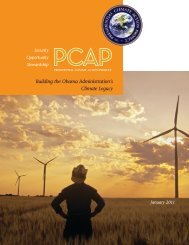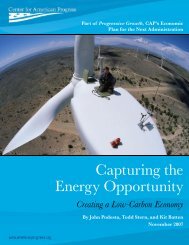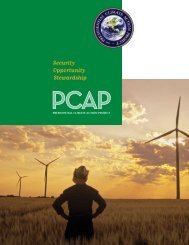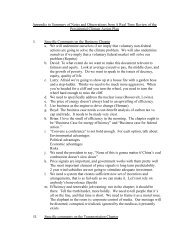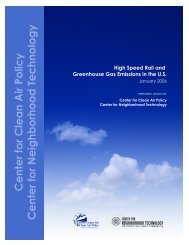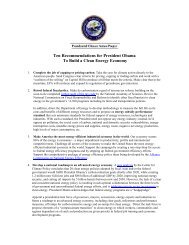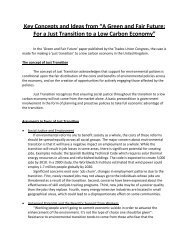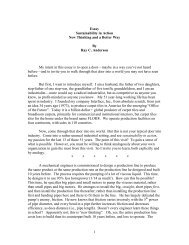This proposal is consistent with and supported by these provisions. 307 Although an executiveorder is not required to give effect to the newly enacted law, the President should still considerissuing one implementing these provisions of the Act. By issuing such an order the Presidentimpresses upon agencies his priorities, gives visibility to the effort, and encourages or mandatesaction at least as quickly as the statute allows. Further, for any standards that are minimalstandards the President can order agencies to pursue more aggressive goals and targets (i.e., if thestandards prescribe only the minimal target or goal that an agency must reach). For example, inregard to the building energy efficiency performance standards, “[t]he head of each Federalagency shall adopt procedures necessary to assure that new Federal buildings meet or exceed theFederal building energy standards established under section 6834 of this title.” 3082. Renewable energy goalsIn addition to the general statutory basis that provides authority for setting this target, see generalauthority for this proposal above, Chapter 2, Proposal C-3 and Proposal A, there is alsoadditional authority established by more specific congressional declarations and statutoryprovisions. A key policy pronouncement is found in 42 U.C.C. § 17285, “Sense of Congressrelating to the use of renewable resources to generate energy:”Congress finds that—(1) the United States has a quantity of renewable energy resources that issufficient to supply a significant portion of the energy needs of the UnitedStates;(2) the agricultural, forestry, and working land of the United States can helpensure a sustainable domestic energy system;(3) accelerated development and use of renewable energy technologiesprovide numerous benefits to the United States, including improvednational security, improved balance of payments, healthier rural economies,improved environmental quality, and abundant, reliable, and affordableenergy for all citizens of the United States;(4) the production of transportation fuels from renewable energy would helpthe United States meet rapidly growing domestic and global energydemands, reduce the dependence of the United States on energy importedfrom volatile regions of the world that are politically unstable, stabilize thecost and availability of energy, and safeguard the economy and security ofthe United States;307 See also, 42 U.S.C. § 6361 (President shall develop 10-year plan for energy conservation with respect tobuildings owned or leased by an agency of the United States).308 42 U.S.C. § 6835 (a).CEES 77 | P age
(5) increased energy production from domestic renewable resources wouldattract substantial new investments in energy infrastructure, createeconomic growth, develop new jobs for the citizens of the United States,and increase the income for farm, ranch, and forestry jobs in the ruralregions of the United States;(6) increased use of renewable energy is practical and can be cost effectivewith the implementation of supportive policies and proper incentives tostimulate markets and infrastructure; and(7) public policies aimed at enhancing renewable energy production andaccelerating technological improvements will further reduce energy costsover time and increase market demand. 309Examples of other relevant provisions that support this order include: the National Energy PolicyPlan, 42 U.S.C. § 13382(a)(4) (One of the five primary LCES goals is to increase the percentageof energy derived from renewable resources, see Proposal A); NEPA, 42 U.S.C. § 4331(establishing national environmental policy); Renewable Energy and Energy EfficiencyTechnology Competitiveness, 42 U.S.C. § 12001(a) (“The Congress finds that it is in the nationalsecurity and economic interest of the United States to foster greater efficiency in the use ofavailable energy supplies and greater use of renewable energy technologies.”); RenewableEnergy Initiatives, 42 U.S.C. § 7371 (“The purpose of this subchapter is to establish incentivesfor the use of renewable energy resources . . . .”).E.O. 13123, issued by President Clinton on June 8, 1999, established a renewable energy target.The Order was revoked by subsequent executive order, E.O. 13423, issued by George W. Bushin 2007.3. GHG emission reduction goalsThis parallels the U.S. commitment as a party to the UNFCCC and the priority strategies in theDOE’s LCES. See Proposal A. It combines the President’s substantial role in planning climatechange policy, see Chapter II, with his broad authority over the management of agencyoperation.E.O. 13123 established the following GHG emission reduction goals: reduce GHG emissionsattributed to federal facility energy use 30% by 2005 (relative to 1990), and 25% by 2010. ThisOrder was in effect from 1999 through January 24, 2007 (revoked by E.O. 13423).309 42 U.S.C. § 17285(a). The Act goes on to establish the following goal of the United States: not laterthan January 1, 2025, the agricultural, forestry, and working land of the United States should providefrom renewable resources not less than 25 percent of the total energy consumed in the United States.Id. at § 17285 (b).CEES 78 | P age
- Page 1 and 2:
THE BOUNDARIES OF EXECUTIVE AUTHORI
- Page 4 and 5:
This page left intentionally blank.
- Page 6 and 7:
Proposal IndexPage NumberA Establis
- Page 8 and 9:
D-01 Direct the federal Climate Cha
- Page 10:
I. IntroductionThis report is a fol
- Page 16 and 17:
• The President shall not substit
- Page 18 and 19:
42, Chapter 77, Subchapter III expl
- Page 20 and 21:
In addition, it delegates to the Pr
- Page 22 and 23:
C. Presidential ProclamationsThere
- Page 24 and 25:
2. The developed country Parties an
- Page 26 and 27:
A. Establish National Energy and Ca
- Page 28 and 29:
the Nation, paying particular atten
- Page 30 and 31:
The President should establish the
- Page 32 and 33:
The President should establish the
- Page 34 and 35:
This proposal is framed in terms of
- Page 36 and 37: partnership is working to reduce me
- Page 38 and 39: Good candidate to implement by exec
- Page 40 and 41: Executive Orders. There are 30 exec
- Page 42 and 43: Congress annually a comprehensive r
- Page 44 and 45: The Rural Utilities Services (RUS)
- Page 46 and 47: through the energy policy, has some
- Page 48 and 49: Direct the EPA to work with the Chi
- Page 50 and 51: private members: E.O. 12216, the Pr
- Page 52 and 53: next 20 years.” 181 From the publ
- Page 54 and 55: Direct the EPA to immediately begin
- Page 56 and 57: scientific judgment.” 199 Further
- Page 58 and 59: Direct the EPA to immediately grant
- Page 60 and 61: of climate change in California are
- Page 62 and 63: Direct the EPA and DOE to collabora
- Page 64 and 65: The ATA is a private entity, and as
- Page 66 and 67: and Bioenergy, establishes an inter
- Page 68 and 69: Authority over the Entities Subject
- Page 70 and 71: Direct the DOT to reconvene the Cli
- Page 72 and 73: Direct NASA to restore earth scienc
- Page 74 and 75: Direct the Council on Environmental
- Page 76 and 77: C. Improve Federal StewardshipDirec
- Page 78 and 79: 3. Background.OMB performs legislat
- Page 80 and 81: There are numerous executive orders
- Page 82 and 83: Federal Energy Management Executive
- Page 84 and 85: 1973; (3) E.O. 12845, Requiring Age
- Page 88 and 89: 4. GHG reduction goals to transport
- Page 90 and 91: President, but the President “may
- Page 92 and 93: Declare that it is the responsibili
- Page 94 and 95: 1. Statutory provisions that establ
- Page 96 and 97: whenever feasible; and disposal or
- Page 98 and 99: species is listed as a threatened s
- Page 100 and 101: Determination of priorities which a
- Page 102 and 103: 3.2 Declaring that it is the respon
- Page 104 and 105: Management, (June 3, 1999) includes
- Page 106 and 107: economic, and other requirements of
- Page 108 and 109: environment.” Based on the polici
- Page 110 and 111: D. Protect American Taxpayers from
- Page 112 and 113: special committees but are expressl
- Page 114 and 115: Direct the federal Climate Change S
- Page 116 and 117: The CCSP is an executive branch age
- Page 118 and 119: E. Mobilize the MarketplaceDirect t
- Page 120 and 121: pollutants. Further, courts give gr
- Page 122 and 123: Direct the Council on Environmental
- Page 124 and 125: methods, and data related to sustai
- Page 126 and 127: F. Build Public-Private Partnership
- Page 128 and 129: printed in the Federal Register and
- Page 130 and 131: that officer or employee. Advisory
- Page 132 and 133: A-06A-07B-01B-02B-03B-04B-05B-06B-0
- Page 134 and 135: C-02.7C-02.8C-02.9C-03C-03.1C-03.2C
- Page 136 and 137:
Appendix AStatutes with Specific Te
- Page 138 and 139:
(C) assess the potential for the de
- Page 140 and 141:
15 U.S.C.A. § 657hTitle 15. Commer
- Page 142 and 143:
(5) Climate fluctuation and change
- Page 144 and 145:
(4) global data collection, and mon
- Page 146 and 147:
15 U.S.C.A. § 2932§ 2932. Committ
- Page 148 and 149:
implementation of any Federal actio
- Page 150 and 151:
(2) Projects eligible for funding u
- Page 152 and 153:
emissions associated with each type
- Page 154 and 155:
22 U.S.C.A. § 7902§ 7902. Reducti
- Page 156 and 157:
(c) Performance reviews and reports
- Page 158 and 159:
(3) Priority for integrated gasific
- Page 160 and 161:
[It is the purpose of this chapter
- Page 162 and 163:
(i) that no low greenhouse gas emit
- Page 164 and 165:
(3) prepare and transmit to the Con
- Page 166 and 167:
42 U.S.C.A. § 13384§ 13384. Asses
- Page 168 and 169:
(i) Selection of projects(3) In sel
- Page 170 and 171:
(1) In generalThe Secretary, in con
- Page 172 and 173:
(b) GoalsThe program shall have the
- Page 174 and 175:
Subchapter II. Energy Security thro
- Page 176 and 177:
Subchapter IV. Energy Savings in Go
- Page 178 and 179:
(B) to reduce emissions of covered
- Page 180 and 181:
§ 17334. Actions by overseas priva
- Page 182 and 183:
(5) be committed to minimizing admi
- Page 184 and 185:
Appendix BProclamations that Addres
- Page 186 and 187:
8) Proc. 7150, Nov. 20, 1998, World



